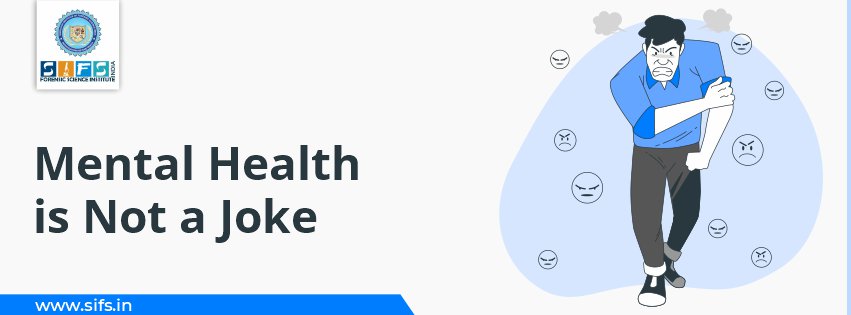- Call Us: +91 7303913002
- Email Us: education@sifs.in
Mental Health is Not a Joke: Facts and Challenges

BY SIFS India | June 16, 2024
Mental Health is Not a Joke: Facts and Challenges
Calling someone 'mental' or 'mentally unstable' or 'neurotic' is so normal in today's time. Like it's a joke or slang to throw around.
Not many people are ready to understand the seriousness of mental health issues in our country.
They are not even ready to try to understand.
People suffering are looked upon as a joke and their struggles are 'minimized' by the idea that they are making an excuse to be lazy or incompetent.
They are left to suffer alone with their sadness and helplessness inside, with no one to understand and help them.
What else can we expect from a generational stereotype which makes it so normal to call a suicidal person ‘weak’?
Someone with depression is termed as 'Devdas'.
Anxiety, panic attack, eating disorders are used as casual day-to-day slang. Sufferers are called lazy or attention seekers and what not.
All of this starts from our childhood where we are taught, "Early to bed and early to rise, makes a man healthy, wealthy and wise."
We are told that everything can be fine only if we follow a certain strict routine without taking into consideration our physical or mental conditions.
When kids are fed such a toxic mentality from their childhood, what else can we expect them to develop into.
Toxic positivity is one of the reason that sells the idea of blaming people with actual mental health disorders for not being able to function according to societal norms. They are expected to just snap out of it and stop being over-dramatic and over-sensitive.
They are told to stop overthinking and 'stressing about small things. It's the same as telling a blind person to just start seeing.
Mainstream movies and social media are some of the major reasons that contribute to this stigma about mental health.
A mentally ill character is mostly used as a comic relief or a dumb character, bullying whom is totally normal and funny.
The identity and existence of such characters have no actual importance rather than seeking sympathy and help.
Even social media promotes such stigma.
Many so-called influencers sell the idea of the perfect lifestyle and body type. This creates huge insecurity and self-doubt among the viewers. They get filled with the feeling that they are not enough because of the constant comparisons. And to be enough, they need to 'hustle' all the time.
The effect of making mental health a joke is that people use these terms casually with no knowledge, for even the slightest inconvenience, and the ones who are actually suffering are mocked at and are ashamed or scared to share about their sufferings.
A lot of courage is required to actually share about what they are going through and after being subjected to such misbehaviors, they take a step back.
And it gets even harder to try again.
Some people might say that joking about mental health and using it casually helps to normalize it in society. That joking does not do any harm and people should sportingly handle it.
They forget that this normalizes the stigma around mental health and not the actual mental health issues. It pushes the people further away from even trying to accept it.
Be it their own struggle or someone else's, they are knowingly or unknowingly forced to forever be in denial.
People will accept and talk about it when they know they won't be made fun of.
They won't be scared to share about their sufferings when they know they won't be blamed and mocked.
Saying, 'You need therapy', as a joke makes therapy an insult. It makes people doubt the ability and importance of therapy more and more. Which is just the opposite of what is actually required.
Mental illness is not something to joke about.
People need to own it and be more responsible and considerate about dealing with it.
They should understand that the damage cannot be avoided that comes with such jokes.
They should either support it or leave it untouched.
So many people are suffering in silence.
So many are suffering alone.
They are scared and confused and isolated.
Instead of making fun of them, we should try to make a healthy and comfortable environment that can make them feel accepted and understood.
An environment that discards toxicity and lets people rest and heal. Everyone deserves to live a normal life. And that ‘normal’ should be based on an individual’s need and circumstances and not some standardized rule.

